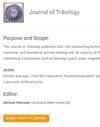Investigation of Roller Bearing Cage Pocket Lubrication and Friction
IF 3
3区 工程技术
Q2 ENGINEERING, MECHANICAL
引用次数: 3
Abstract
A test rig was designed and developed to assess the lubrication and friction of a single cylindrical roller and a conformal cage pocket. The roller was lubricated via oil bath in a sealed housing. Inner and outer bearing raceway pieces were fixed above and below the roller to mimic the internal geometry of an actual bearing. The cage pocket was made from transparent acrylic to look inside the cage and observe oil flow during operation. A six-axis load cell was used to measure the torque generated by the entire test rig with and without the cage pocket, and used to isolate the friction of the cage pocket. Experiments were conducted to investigate the effects of roller-pocket clearance, roller-race clearance, and roller oil submersion level at rest. Results suggest that roller bearing cage pocket friction increases with decreasing pocket clearance, increasing oil availability, and increasing operating speed. The oil was observed to coalesce into stable striations inside the cage pocket for many operating conditions. Striation width was observed to decrease with increasing speed, increasing pocket clearance, and decreasing oil availability. The striations were summarized by oil volume fraction inside the cage pocket, which decreased with increasing speed, decreasing pocket clearance and decreasing oil availability. The current results provide new information about oil behavior inside roller bearing cage pockets during operation, and an approach is presented to estimate roller bearing cage pocket friction.滚子轴承保持架腔润滑与摩擦研究
设计并开发了一个试验台,用于评估单个圆柱滚子和保形保持架口袋的润滑和摩擦。滚筒通过密封外壳中的油浴进行润滑。内轴承滚道和外轴承滚道固定在滚子的上方和下方,以模拟实际轴承的内部几何形状。笼子口袋由透明丙烯酸制成,用于观察笼子内部,并在操作过程中观察油的流动。六轴称重传感器用于测量整个试验台在有和没有笼袋的情况下产生的扭矩,并用于隔离笼袋的摩擦。通过试验研究了静止状态下滚子轴承座间隙、滚子座圈间隙和滚子浸油量的影响。结果表明,滚子轴承保持架座摩擦随着轴承座间隙的减小、油量的增加和运行速度的提高而增加。在许多操作条件下,观察到油在笼袋内聚结成稳定的条纹。观察到条纹宽度随着速度的增加、口袋间隙的增加和油的可用性的降低而减小。条纹通过笼腔内部的油体积分数来概括,油体积分数随着速度的增加、笼腔间隙的减小和油的可用性的降低而减小。目前的结果提供了有关运行过程中滚子轴承保持架槽内油液行为的新信息,并提出了一种估计滚子轴承保持座槽摩擦的方法。
本文章由计算机程序翻译,如有差异,请以英文原文为准。
求助全文
约1分钟内获得全文
求助全文
来源期刊
CiteScore
4.20
自引率
12.00%
发文量
117
审稿时长
4.1 months
期刊介绍:
The Journal of Tribology publishes over 100 outstanding technical articles of permanent interest to the tribology community annually and attracts articles by tribologists from around the world. The journal features a mix of experimental, numerical, and theoretical articles dealing with all aspects of the field. In addition to being of interest to engineers and other scientists doing research in the field, the Journal is also of great importance to engineers who design or use mechanical components such as bearings, gears, seals, magnetic recording heads and disks, or prosthetic joints, or who are involved with manufacturing processes.
Scope: Friction and wear; Fluid film lubrication; Elastohydrodynamic lubrication; Surface properties and characterization; Contact mechanics; Magnetic recordings; Tribological systems; Seals; Bearing design and technology; Gears; Metalworking; Lubricants; Artificial joints

 求助内容:
求助内容: 应助结果提醒方式:
应助结果提醒方式:


